Current projects

BASIN-NMF
Project: Boosting Audio Segmentation Interpretability with Non-negative Matrix Factorization
Date: 03/2025 - 02/2027
Funding: Région Pays de la Loire
Call: PULSAR
Author(s): Théo Mariotte
URL: https://lium.univ-lemans.fr/en/basin-nmf/
The project aims at improving interpretability of neural models used for audio segmentation (e.g. speaker diarization). These models are usually considered as black-boxes which provide the segmentation from the audio signal. However, it is necessary in some context to inform the user on how the decision is made by the system. The objectives threefold: (1) improve signal reconstruction from the latent space to reconstruct listenable explanations, (2) disentangle the latent spaces on explainable attributes and (3) extend the method to the temporal dimension to better understand the temporal structure of the representations. ► Read more
TSA VR
Project: Visual search in natural environments in autism spectrum disorder
Date: 09/2024 - 09/2027
Funding: Autres
Call:
Author(s): Erwan David, Pierre Laforcade
URL: https://lium.univ-lemans.fr/en/asd_vr/
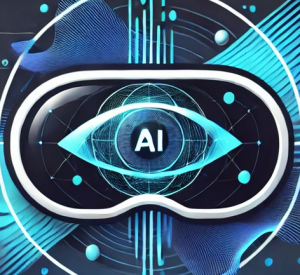
Spatio-Temporal ARIA
Project: Integrating Spatio-Temporal Reasoning into Augmented Reality Headsets Using AI
Date: 01/2025 - 01/2028
Funding: Autres
Call: co-finnacé par VMWare au Quebec et la Région Pays de la Loire
Partners: DOMUS (Canada), VMWare (Canada)Author(s): Iza Marfisi, Benjamin Georges
URL: https://lium.univ-lemans.fr/en/spatio-temporal-aria/
Integrating Spatio-Temporal Reasoning into Augmented Reality Headsets Using AI ► Read more
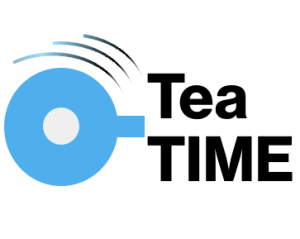
Tea-Time
Project: Teacher’s Technology Integration Models in Education
Date: 01/2024 - 01/2028
Funding: ANR
Call: ANR PRCE
Partners: TECHNÉ de l’Université de Poitiers, CREN de l’Université du Mans, LIRIS à Lyon, IRIT à Toulouse, entreprise ÉdificeAuthor(s): Rémi Venant
URL: https://techne.labo.univ-poitiers.fr/tea-time/
The TEA-TIME (Teacher's Technology Integration Models in Education) project aims to develop the digital maturity of teachers for the implementation of certain forms of pedagogy, those based on ACA-AR: Learning Activities integrating APC (competency-based approach), based on regulations supported by AI and Self-Regulation. ► Read more
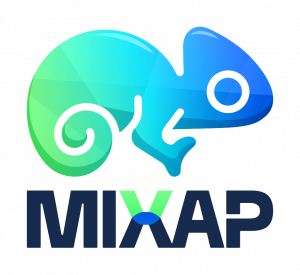
MIXAP-EU
Project: MIXed reality for Augmented Pedagogy in EUrope
Date: 11/2024 - 10/2027
Funding: Autres
Call: ERASMUS+
Partners: DTU - DANMARKS TEKNISKE UNIVERSITET (Denmark), BAHCESEHIR UNIVERSITESI FOUNDATION (Turkey)Author(s): Iza Marfisi, Oussama Seddini, Mohamed Hamza Falih, Sébastien George, Sebastian Simon
URL: https://mixap-lium.univ-lemans.fr/
The MIXAP-EU research project aims to help primary and secondary school teachers use Mixed Reality (MR). ► Read more

TV2M-E
Project: Multilingual Multimodal Voice Translation - Expressive
Date: 06/2024 - 06/2026
Funding: Région Pays de la Loire
Call: PULSAR
Author(s): Aghilas Sini
URL: https://lium.univ-lemans.fr/en/tv2m-e/
A bilingual or polyglot speaker has the ability to communicate coherently in several languages, adapting to different contexts. Transferring this skill to machines could contribute to the preservation of cultural heritage by maintaining less privileged languages, facilitating interaction between people of different cultures and languages, and reinforcing safety measures. ► Read more

GTnum FORGES
Project: Projet Groupe Numérique Thématique Forges
Date: 11/2023 - 12/2027
Funding: Autres
Call: GTnum du Minitère de l'Education National
Partners: Crentre de Recherche en Education de Nantes (CREN) (France), DRANE Ac. des Pays de Loire et DRANE de Bretagne (France), Réseau Canopé (France), INSPE (France), INTERACT et CUREJ, Université de Rouen Normandie (France)Author(s): Bertrand Marne , Iza Marfisi, Thierry Forest
URL: https://gtnum.forge.apps.education.fr/
Le projet GTnum Forges aborde la problématique de l’utilisation des forges logicielles par tous les enseignants sous un angle novateur. Nous proposons d’analyser les pratiques existantes de conception, partage, collaboration des enseignant es pour penser de nouvelles interfaces orientées éducation pour les forges. ► Read more
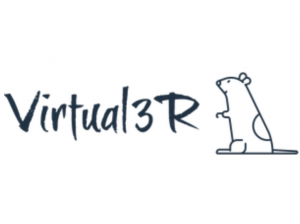
Virtual 3R
Project: Plateforme virtuelle pour l'expérimentation animale
Date: 09/2022 - 12/2027
Funding: Autres
Call: Cofinancés par Le Mans université et la Fondation Nationale des IUT de France
Partners: Fondation Nationale des IUT de France, Département GB - IUT de LAVAL, Département GB - IUT de Lyon, Département GB - IUT de RochelleAuthor(s): Lahcen Oubahssi, Mohamed-Amine Abrache
URL: http://perso.univ-lemans.fr/~loubah/Projets.html
Le projet Virtual3R propose une méthode alternative basée sur la réalité virtuelle pour réduire le nombre d’animaux utilisés en formation à l’expérimentation animale tout en permettant aux étudiants d’acquérir une bonne appréhension des procédures et gestes techniques de base avant la réalisation sur le modèle réel. ► Read more

DIGING
Project: Dynamic and Interpretable Graph-based word embeddINGs
Date: 01/2022 - 12/2026
Funding: ANR
Call: ANR JCJC
Author(s): Nicolas Dugué, Nathalie Camelin, Sylvain Meignier, Jane Wottawa, Simon Guillot, Anna Béranger
URL: https://lium.univ-lemans.fr/en/diging/
Recent approaches to embedding learning have focused on results, often at the expense of interpretability and algorithmic complexity. Yet, interpretability is a necessary pre-requisite for the deployment of such technologies when they are used in sensitive domains such as law or medicine. Moreover, ecological imperatives create an urgent need to think about efficient and computationally efficient systems. With DIGING, we propose a new powerful and computationally efficient approach for the construction of interpretable lexical plots based on the theory of complex networks. With this original approach, the goal is to build vectors integrating polysemy natively by plunging words into a space with interpretable dimensions.
► Read more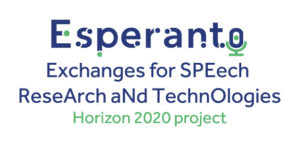
ESPERANTO
Project: Exchanges for SPEech ReseArch aNd TechnOlogies
Date: 01/2021 - 12/2025
Funding: EU H2020
Call: H2020-MSCA-RISE-2020
Partners: academic (MS): Université du Mans, Universidad de Zaragoza, The University of Sheffield, Brno University of Technology, Laboratoire national de métrologie et d’essais (LNE), Université Grenoble Alpes, Avignon Université, University of Yaounde, Consejo Nacional de Investigaciones cientificas y tecnicas, Universidad de Chile, Centro de Aplicaciones de Tecnologías Avanzada, Universiti Malaysia Sarawak, Universiti Sains Malaysia, Johns Hopkins University, Montreal Institute for Learning Algorithms
Non academic: Allo-média, Elyadata, Omilia, Phonexia, National Institute of Standard and Technologies (NIST)Author(s): Anthony Larcher, Loïc Barrault, Fethi Bougares, Antoine Laurent, Meysam Shamsi, Marie Tahon, Jane Wottawa, Grégor Dupuy, Emmanuelle Billard, Martin Lebourdais, Théo Mariotte, Thibault Gaudier, Thomas Thebaud, Valentin Pelloin, Mohammad Mohammadamini, Aghilas Sini
URL: http://esperanto.univ-lemans.fr/en/index.html
ESPERANTO is a collaborative research program based on a partnership between 15 academic and 4 non-academic partners, having complementary expertise and resources. The Esperanto project involves academic institutions leading the field of speech processing on 4 continents for decades and covering a large range of speech processing applications. ESPERANTO will contribute to the development of the next generation of AI; AI interacting with their users for better learning but also explainable systems: systems whose decisions are understandable by humans. In order to make these technologies accessible to the largest number of people, ESPERANTO will address applications with limited resources in the field of rare languages, robotics or education.
► Read more
Ludifik’action
Project: Helping teachers create custom Learning Games for their courses
Date: 01/2017 - 01/2027
Funding: Autres
Call: financement prix PEPS 2018
Partners: UBLAuthor(s): Iza Marfisi, Sébastien George, Bertrand Marne
URL: https://lium.univ-lemans.fr/wp-content/uploads/2023/07/Fiche-Formation_Ludifik-action_10-07-2023.pdf
The ambition of this annual professional training course is to accompany teachers in the creating of a custom Learning Game for their specific educational objectives. ► Read more
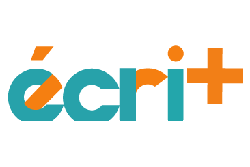
écri+
Project: Evaluation, training and certification plan for improving the writing and reading skills in French
Date: 04/2018 - 03/2028
Funding: PIA (Programme Investissements d'Avenir)
Call: Nouveaux Cursus à l’Université (NCU)
Partners: Université Paris Nanterre (France), Université Nice Sophia Antipolis (France), Université Paul-Valéry Montpellier 3 (France), Université de Caen Normandie (France), Le Mans Université (France), Université Grenoble Alpes (France), Université Sorbonne Nouvelle – Paris 3 (France), Université Paris 1 Panthéon-Sorbonne (France), Université Rennes 2 (France), Université Toulouse Jean Jaurès (France), VetAgro Sup (France), Centre universitaire de Mayotte (France), PIX (France), Institut de Recherche et d’Innovation (France).Author(s): Nicolas Dugué, Sébastien George, Madeth May, Claudine Piau-Toffolon, Dominique Py, Albane Gril
URL: http://ecriplus.fr/
Mastery of the French language is essential at all levels of the school system in France and becomes crucial on entry to university. Nonetheless, a large number of students encounter difficulties with the language. Confronted with this situation, it is the responsibility of universities to design and organise the appropriate means for students to improve their written skills in French. ► Read more
List of past projects
- Fond muséographique IC²
- VirtualNDT
- PereFRALL
- Atelier « Libérer les EIAH grâce aux communs et aux Logiciels Libres »
- COMMUTE
- EVAGO
- MIXAP
- AdapTABLES
- SMART-Fractions
- SituLearn
- DIETS
- SpeechBrain
- GEM
- CapDiff
- AISSPER
- EXTENSOR
- ASSC
- PolysEmY
- C3LS
- ON-TRAC
- ORPHEE
- VEA
- DEEP-PRIVACY
- SIMPÆX
- Néo
- News.bridge
- ALLIES
- RAPACE
- Antract
- Escape it!
- MAGMAT
- PASTEL
- TGRIS
- Blackcompass
- TurtleTablet
- ReVeRIES
- EmoTED
- M2CR
- JOKER
- HUBBLE
- JEN.lab
- EUMSSI
- VERA
- ARVAD
- GraphiT
Distributed projects
Past projects

Fond muséographique IC²
Project: Computer science artifacts museum
Date: -
Funding: Autres
Call:
Author(s): Jérôme Lehuen
URL: https://lium.univ-lemans.fr/en/musee-info-ic2/
VirtualNDT
Project: Virtual Reality Platform for Non Destructive Testing & Evaluation Training
Date: -
Funding: Autres
Call:
Author(s): Lahcen Oubahssi
URL: https://lium.univ-lemans.fr/en/virtualndt/

PereFRALL
Project: Thinking Franco-German relations
Date: 09/2023 - 08/2024
Funding: Autres
Call: Amorçage interdisciplinaire MSH Ange-Guépin
Partners: Centre de Recherche sur les identités, les Nations et l’Interculturalité (CRINI) (France)Author(s): Jane Wottawa
URL: https://lium.univ-lemans.fr/en/perefrall/
When we think of Franco-German relations, it is clear that they are not described in the same terms on either side of the Rhine. While the figure of the "couple" dominates the perception of Franco-German cooperation in France, in Germany it is seen in terms of the "tandem". By studying the notions, metaphors and patterns of perception used to think about Franco-German relations, this project aims to identify the similarities and differences in the way the French and Germans view relations between their countries. Ultimately, the aim is to find out whether there is a shared Franco-German imaginary. ► Read more
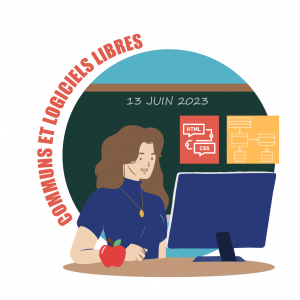
Atelier « Libérer les EIAH grâce aux communs et aux Logiciels Libres »
Project: Atelier « Libérer les EIAH grâce aux communs et aux Logiciels Libres »
Date: 02/2023 - 02/2024
Funding: Autres
Call:
Partners: CRENAuthor(s): Bertrand Marne , Iza Marfisi
URL: https://lium.univ-lemans.fr/en/atelier-logiciels-libres/
Le LIUM et le CREN organise un atelier « Libérer les EIAH grâce aux communs et aux Logiciels Libres » forme de table ronde à la conférence nationale EIAH 2023. ► Read more
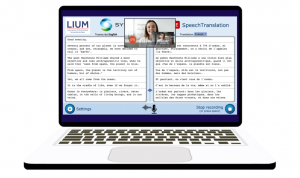
COMMUTE
Project: Online Multilingual Communication Support Platform
Date: 12/2022 - 11/2025
Funding: Autres
Call: DUALE-RAPID
Partners: ChapsVision (France)Author(s): Antoine Laurent, Mohammad Mohammadamini, Marie Tahon, Aghilas Sini, Hugo Riguidel, Emmanuelle Billard
URL: https://lium.univ-lemans.fr/en/projet-commute/
Our project aims at integrating the production of speech recognition and translation into an online communication tool, which will create a true barrier-free communication platform. The project will focus on the production of French and English translations from an Arabic and English speech source.
► Read more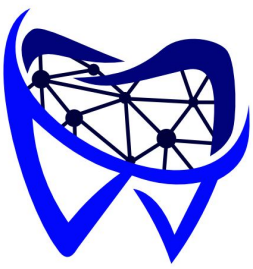
EVAGO
Project: Virtual Environment for the Assistance in Learning of Odontology Gestures
Date: 01/2022 - 12/2025
Funding: ANR
Call:
Partners: entreprise Haptique et Réalité Virtuelle (HRV) (France), Laboratoire Regenerative Medicine and Skeleton (RMeS) (France), Le Pôle Hospitalo-Universitaire Otonn (PHU4) (France), Le Centre de Recherche en Éducation de Nantes (CREN) (France)Author(s): Ludovic Hamon, Sébastien George, Vincent Agueda, Mohamed Nail Hefied
URL: https://evago-lium.univ-lemans.fr/
Le projet EVAGO étend les fonctionnalités de l’Environnement Virtuel (EV) Virteasy dédié à la formation en chirurgie dentaire (Odontologie), avec des modèles et outils pour évaluer automatiquement le geste technique dans son ensemble i.e. ► Read more
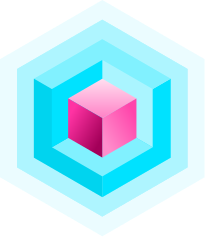
MIXAP
Project: Mixed, Augmented and Virtual Reality Authoring Tools for teachers
Date: 11/2021 - 02/2025
Funding: Autres
Call: Dispositif Etoile Montante des Pays de la Loire
Partners: réseau CANOPE (France), CREN (France)Author(s): Iza Marfisi, Mohamed Ez-Zaouia
URL: https://mixap-lium.univ-lemans.fr/
L’enjeu du projet MIXAP est de concevoir des « éditeurs » simples pour permettre aux enseignants de créer leurs propres outils pédagogiques numériques avec des interactions innovantes (réalité augmentée, réalité mixte et réalité virtuelle), sans avoir besoin de compétences en programmation informatique. ► Read more
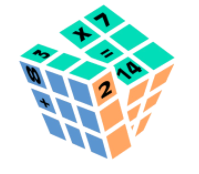
AdapTABLES
Project: An analysis and design framework about adaptable learning&gamified activities, and about the design of adaptive generators of exercices - Application to the learning of multiplication tables
Date: 01/2021 - 09/2024
Funding: Autres
Call:
Author(s): Pierre Laforcade, Sébastien George, Bérénice Lemoine
URL: https://adaptables.univ-lemans.fr/

SMART-Fractions
Project: Study of Mobile Augmented Reality for Teaching Fractions
Date: 09/2020 - 09/2024
Funding: Autres
Call: financement d'entreprise
Partners: Plaisir MathsAuthor(s): Sébastien George, Iza Marfisi, Sofiane Touel
URL: https://smart-fractions.univ-lemans.fr/fr/index.html
The objective of the SMART-Fractions project is to carry out a study on the educational impact of a board game and its digital extensions for teaching fractions in primary school. ► Read more

SituLearn
Project: Enhancing Situated learning with collaborative Games and Mixed reality
Date: 05/2021 - 12/2024
Funding: ANR
Call: ANR - JCJC - 2020
Author(s): Iza Marfisi, Sébastien George, Pierre Laforcade, Madeth May, Sebastian Simon
URL: https://situlearn.univ-lemans.fr/
Enhancing Situated learning with collaborative Games and Mixed reality ► Read more

DIETS
Project: Diagnostic automatique des erreurs des systèmes de transcription de parole end-to-end à partir de leur réception par les utilisateurs
Date: 02/2021 - 08/2024
Funding: ANR
Call: AAPG2020 - JCJC
Partners: LIA (porteur) (France), LPC (France)Author(s): Jane Wottawa, Antoine Tholly
URL: https://lium.univ-lemans.fr/en/diets/
The DIETS proposes to focus on the problematic of diagnosis/evaluation of end-to-end automatic speech recognition (ASR) systems by integrating human reception of transcription errors from a cognitive point-of-view. The challenge is here twofold: 1) to analyze finely ASR errors from a human reception, and 2) to understand and detect how these errors manifest themselves in an end-to-end ASR framework, whose work is inspired by how the human brain works.
► Read more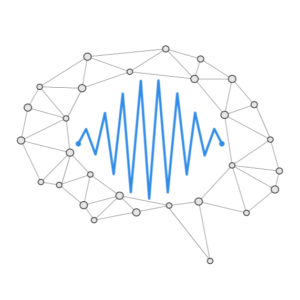
SpeechBrain
Project: SpeechBrain
Date: 09/2019 - 12/2021
Funding: Autres
Call:
Partners: Mila (Canada), LIA (France), PyTorch, IBM Research AI, fluent.ai (Canada)Author(s): Anthony Larcher, Sylvain Meignier
URL: https://speechbrain.github.io
SpeechBrain is an open-source and all-in-one speech toolkit relying on PyTorch. The goal is to create a single, flexible, and user-friendly toolkit that can be used to easily develop state-of-the-art speech technologies, including systems for speech recognition (both end-to-end and HMM-DNN), speaker recognition, speech separation, multi-microphone signal processing (e.g, beamforming), self-supervised and unsupervised learning, speech contamination / augmentation, and many others. ► Read more

GEM
Project: Gender Equality Monitor
Date: 01/2020 - 02/2025
Funding: ANR
Call: AAPG2019
Partners: INA, LIMSI, Carism, Deezer, LERASS, ENS Lyon Author(s): Antoine Laurent, Anthony Larcher, Nathalie Camelin, Nicolas Dugué, Sylvain Meignier, Marie Tahon, Martin Lebourdais
URL: https://lium.univ-lemans.fr/en/gem/
Media and society have an intricate relationship. Descriptive, the media are also prescriptive and shape our perception of the world. The GEM project aims to describe the differences in representation and treatment between women and men in the media, based on the automatic analysis of large volumes of data in French contained in the INA and Deezer collections: TV, radio, print media and music collections. ► Read more

CapDiff
Project: CapDiff
Date: 06/2019 - 12/2020
Funding: Autres
Call: BPI
Partners: LAUM (France), HAAPIE (France), VOXPASS (France)Author(s): Anthony Larcher, Justine Carpentier, Sylvain Meignier
URL: https://lium.univ-lemans.fr/en/capdiff/
The Capdif project aims at developing a differential captation system for speech signal. This system will be designed to precisely locate each speaker in a meeting room, in order to facilitate and thus improve the performance of voice technologies. ► Read more

AISSPER
Project: Artificial Intelligence for Semantically controlled SPEech UndeRstanding
Date: 01/2020 - 10/2024
Funding: ANR
Call: AAPG2019
Partners: LIA (France), Orkis (France)Author(s): Nathalie Camelin, Sylvain Meignier, Antoine Laurent, Valentin Pelloin
URL: https://lium.univ-lemans.fr/en/aissper/
Effective modeling of variabilities, exhibited by human’s speech at phoneme, word, and sentence levels, is still an open research problem for SLU systems. Even more, extracting relevant keywords, themes or concept mentions from either a sentence or an entire spoken document is a difficult task even for the most advanced end-to-end systems. AISSPER aims to develop new paradigms that jointly model acoustic and semantic information for the semantic analysis of oral documents. ► Read more

EXTENSOR
Project: End-To-end Evolutive Neural Networks for Speaker Recognition
Date: 01/2020 - 06/2022
Funding: ANR
Call: AAPG2019
Partners: Eurecom (France)Author(s): Anthony Larcher, Antoine Laurent, Marie Tahon, Sylvain Meignier, Ambuj Mehrish
URL: https://lium.univ-lemans.fr/en/extensor/
ExTENSoR proposes fundamental research that aims to explore the potential of using end-to-end and automatically learned / evolving articial neural networks in order to overcome the limitations of hand-crafted features and network topologies that characterise the current state of the art in many fields of speech processing. ExTENSoR also aims to bring new insights to what information in speech signals is being used in order to arrive at the scores or decisions produced by the network. ExTENSoR will pursue its objectives within the context of automatic speaker recognition and anti-spoofing, two fields of speech processing research showing burgeoning interest in end-to-end, evolutive learning. ► Read more

ASSC
Project: Fine analysis of opinions in corpuses of Customer Satisfaction
Date: 10/2019 - 02/2023
Funding: Autres
Call: MMA
Partners: MMA (France)Author(s): Nathalie Camelin, Nicolas Dugué, Sylvain Meignier, Rémi Bouvet, Mohamed Ettaleb
URL: https://lium.univ-lemans.fr/assc
The MMA group (Mutuelles du Mans Assurances), the leading player in property and casualty insurance in France, is highly involved in the analysis of customer paths. In a customer relationship strategy, MMA wants to determine the factors of satisfaction, commitment and recommendation. Its marketing department conducts satisfaction surveys to collect numerous textual feedback from customers. The volume collected is such that it is impossible to manually process all of this data. That is why the MMA group has called on LIUM's knowledge to automatically analyze opinion information. ► Read more
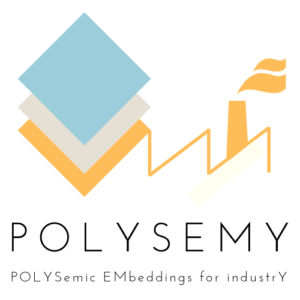
PolysEmY
Project: Polysemic Embeddings for Industry
Date: 01/2020 - 07/2021
Funding: RFI AltanStic 2020
Call:
Partners: SNCF (France)Author(s): Nathalie Camelin, Nicolas Dugué, Jane Wottawa, Gaëtan Caillaut
URL: https://lium.univ-lemans.fr/polysemy
The lexical resources of SNCF's technical documentation testify to the richness and specificities of the business vocabulary used within companies such as SNCF. This vocabulary is sometimes uncommon in corpuses, but according to experts, it is of major importance for the characterization of documents. ► Read more

C3LS
Project: Clustering and Classification on a Corpus in Specialty Language
Date: 11/2017 - 10/2019
Funding: Autres
Call: SNCF
Partners: SNCF (France)Author(s): Nathalie Camelin, Nicolas Dugué
URL: https://lium.univ-lemans.fr/c3ls
The SNCF group is currently undergoing a digital transformation and is increasingly turning to technologies that could use Natural Language Processing (NLP). Business documentation is currently undergoing a major transformation, with businesses that are digitising themselves, becoming more mobile and with new ways of consuming information. Various internal projects have helped to initiate a transition to digital, to find the right information at the right time. Beyond the digitisation of documents, the question arises of new intelligent systems for access to content, interpretation and data entry. The aim of the project is to identify, design and evaluate solutions that can enrich current digital documentation initiatives. The fields of application are writing assistance, information retrieval and navigation in text content. ► Read more

ON-TRAC
Project: Outils Neuronaux End-to-End pour la TRAduction des Communications
Date: 01/2019 - 03/2023
Funding: ANR
Call: Generic
Partners: LIA (Avignon) (France), LIG (Grenoble) (France), Airbus (France)Author(s): Fethi Bougares, Antoine Laurent, Anthony Larcher, Loïc Barrault
URL: https://lium.univ-lemans.fr/en/on-trac/
The ON-TRAC project proposes to radically change the architectures currently used in speech translation. It is based on end-to-end neural models for machine translation and is particularly aimed at lightweight and portable speech translation applications. ► Read more

ORPHEE
Project: Pluridisciplinary Research Organization for e-learning
Date: 12/2014 - 12/2017
Funding: ANR
Call:
Partners: Université Paris 6, Université Lyon 3, Université de Savoie, Université de Fribourg, Université de Genève, Université de Grenoble, Telecom BretagneAuthor(s): Sébastien George, Sébastien Iksal, Iza Marfisi, Claudine Piau-Toffolon
URL: http://atief.fr/content/bienvenue-sur-le-r%C3%A9seau-orphee-de-la-e-education
The Orphée Network aims at structuring Technology-Enhanced Learning (TEL) stakeholders communities (industry with special focus on SMEs, providers, designers, educational institutions and professional associations, decision makers, research laboratories, etc.) in order to leverage the synergy of partners to successfully take up TEL challenges, with effective and sustainable results. The focus of the project is on three main issues: International, Business and Training & Experimentations. A road map will be adopted to sustain the network beyond the two years of the ANR project. ► Read more

VEA
Project: Virtual Environment for Animal experimentation
Date: 01/2019 - 12/2020
Funding: Autres
Call: Appel à projets de recherche - IUT de Laval - 2019
Partners: Département GB - IUT de LAVALAuthor(s): Lahcen Oubahssi
URL: http://perso.univ-lemans.fr/~loubah/Projets.html
L’objectif principal de ce travail est de proposer aux étudiants et aux enseignants du département Génie Biologique une méthode alternative basée sur la réalité virtuelle pour : apprendre les gestes corrects tout en respectant les règles d’éthique ► Read more
DEEP-PRIVACY
Project: DEEP-PRIVACY
Date: 01/2019 - 12/2022
Funding: ANR
Call: generic
Partners: Multispeech (France), LIA (France), Magnet (France)Author(s): Anthony Larcher, Antoine Laurent, Marie Tahon, Pierre Champion
URL: https://lium.univ-lemans.fr/en/deep-privacy/
DEEP-PRIVACY proposes a new paradigm based on a distributed, personalized, and privacy-preserving approach for speech processing, with a focus on machine learning algorithms for speech recognition. To this end, we propose to rely on a hybrid approach: the device of each user does not share its raw speech data and runs some private computations locally, while some cross-user computations are done by communicating through a server (or a peer-to-peer network).
► Read more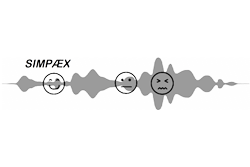
SIMPÆX
Project: SIMPÆX
Date: 02/2018 - 09/2020
Funding: RFI AltanStic 2020
Call: Amorçage, Défis scientifique 2017
Author(s): Marie Tahon
URL: https://lium.univ-lemans.fr/en/simpaex/
The SIMPÆX project aims at the automatic segmentation and identification of expressive styles and speakers in a speech corpus. Indeed the extraction of features concerning the speaker, his emotional state and the social context, offers very relevant clues for various applications such as audio indexing, automatic speech recognition, speech synthesis or human-machine interactions. ► Read more
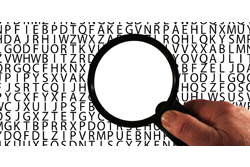
Néo
Project: Néo
Date: 02/2018 - 01/2020
Funding: RFI AltanStic 2020
Call: Amorçage, Défis scientifique 2017
Partners: Laboratoire ERIC (France), CRTT (France)Author(s): Nicolas Dugué, Nathalie Camelin
URL: https://lium.univ-lemans.fr/en/neo/
Neo is an interdisciplinary digital humanities research project aiming at the semi-automatic detection and analysis of contemporary neology. It results from the convergence of new language practices of the modern web (creation of new words or emergence of new senses) and recent advances in natural language processing, notably via lexicographic methods. This project combines the text mining skills of computer scientists with the experience of studying the neologisms of researchers in applied linguistics. ► Read more

News.bridge
Project: News.bridge
Date: 01/2018 - 06/2019
Funding: Google
Call: Digital News Innovation Funding
Partners: Deutsche Welle, Latvian News Agency, PriberamAuthor(s): Sahar Ghannay, Natalia Tomashenko, Yannick Estève
URL: https://lium.univ-lemans.fr/en/news-bridge/
The NEWS-BRIDGE project will build a commercially exploitable integrated tool with a complete workflow using language technologies to facilitate and enhance multilingual news production. This tool provides for a full broadcast news translation system, rendering existing audio, video and text news content in any of the languages supported by the various external tools for transcription, translation, voice synthesis and summarization in a variety of forms and automation applications. It combines different technologies, including speech-to-text, machine translation, text-to-speech and automated summarization. It allows for customization towards the clients, offering the user the option to get the audio of online video content into their language of choice, either as a voice-over or as subtitles by a simple mouseclick. ► Read more

ALLIES
Project: Autonomous Lifelong Learning IntelligEnt Systems
Date: 12/2017 - 03/2022
Funding: EU H2020
Call: chist-era
Partners: IDIAP (Switzerland), UPC (Span), LNE (France)Author(s): Anthony Larcher, Loïc Barrault, Fethi Bougares, Sylvain Meignier, Yevhenii Prokopalo, Meysam Shamsi
URL: https://allies.univ-lemans.fr/
The goal of the ALLIES project is to encourage and demonstrate the development of autonomous systems, able to sustain performance across time according to a given learning scenario. A learning scenario defines the importance given to the performance on “past” and “present” data in the optimization (or evaluation) process. By setting the learning scenario, a human supervisor (HS) allows or forbids the system to forget. In ALLIES, an autonomous system is fully unsupervised, incrementally adapting its models but also their structure to learn or forget events according to the given learning scenario and data that it automatically collects across time. ► Read more

RAPACE
Project: Deep neural networks for oral and written language processing
Date: 10/2017 - 09/2020
Funding: RFI AltanStic 2020
Call: Défis scientifiques 2016
Partners: LINA (France)Author(s): Antoine Caubrière, Antoine Laurent, Yannick Estève
URL: https://lium.univ-lemans.fr/en/rapace/
The RAPACE project aims to bring to the field of automatic processing of oral and written language the latest advances resulting from the field of automatic learning and concerning deep neural networks. ► Read more

Antract
Project: Transdisciplinary Analysis of French Newsreels (1945-1969)
Date: 10/2017 - 03/2022
Funding: ANR
Call: Generic
Partners: INA (France), EURECOM (France), Voxolab (France), CHS (France)Author(s): Simon Petitrenaud, Antoine Laurent, Sylvain Meignier, Pierre-Alexandre Broux
URL: https://lium.univ-lemans.fr/en/antract/
The general objective of the ANTRACT project is the analysis of the images and sounds produced weekly in the framework of an independent company created in 1945, les Actualités françaises (French News), over twenty five years. This major cinematographic vector, already partially worked, has never been the subject of a systematic analysis. ► Read more
Escape it!
Project: Escape it!
Date: 01/2017 - 12/2021
Funding: UBL
Call: Programme d’Attractivité Post-Doctorale
Author(s): Youness Laghouaouta, Pierre Laforcade
URL: https://projets-lium.univ-lemans.fr/escapeit/
Ce projet aborde la complexité de la conception de jeux sérieux pédagogiques lorsqu’ils sont adaptés à un public et à un domaine d’apprentissage spécifiques, et lorsque le besoin d’adaptation (dynamique) des jeux au profil de l’apprenant est nécessaire. ► Read more
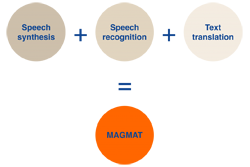
MAGMAT
Project: MAGMAT
Date: 10/2016 - 10/2019
Funding: DGA/DGF
Call: Rapid
Partners: Airbus D&S (France), Voxygen (France)Author(s): Loïc Barrault, Walid Aransa
URL: https://lium.univ-lemans.fr/en/magmat/
Le projet MAGMAT vise à définir et mettre en œuvre une méthodologie agile et incrémentale de développement en temps contraint d’un système de traduction le la parole vers la parole. Sur le plan du développement de langues, deux objectifs principaux sont à considérer. Le premier objectif est de mutualiser drastiquement les développements de la synthèse, de la transcription et de la traduction avec une mise commun les ressources linguistiques. Le second objectif est de définir une méthodologie rendant le processus de développement de langue adapté au contexte visé. ► Read more

PASTEL
Project: PASTEL
Date: 10/2016 - 04/2021
Funding: ANR
Call: Interactions, Robotique, Contenus / Automatique, signal 2016
Partners: Orange Lab (France), cren (France), LS2N (France)Author(s): Christophe Choquet, Antoine Laurent, Vincent Bettenfeld, Nathalie Camelin, Christophe Després, Madeth May, Salima Mdhaffar, Lahcen Oubahssi, Claudine Piau-Toffolon, Asmaa Darouich, Rémi Venant
URL: https://pastel.univ-lemans.fr/
PASTEL is a research project that aims to explore the potential of real time and automatic transcriptions for the instrumentation of mixed educational situations where the modalities of the interactions can be face-to-face or online, synchronous or asynchronous. The speech recognition technology approaches a maturity level that allows new opportunities of instrumentation in pedagogical practices and their new uses. ► Read more
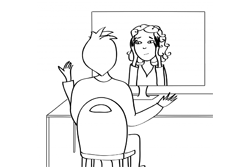
TGRIS
Project: Simulation for training on emotions
Date: 09/2016 - 12/2021
Funding: RFI AltanStic 2020
Call: starter project
Partners: Lab-STICC (France), cren (France)Author(s): Iza Marfisi
URL: https://lium.univ-lemans.fr/en/tgris/
TGRIS : Teacher-Guided Realistic Interview Simulator The objective of this project is to design and develop a Virtual Reality simulation tool, capable of recreating situations that are evocative of real, emotionally intense, professional situations. ► Read more

Blackcompass
Project: Blackcompass
Date: 04/2016 - 04/2018
Funding: Région Pays de la Loire
Call: Fonds Pays de la Loire Territoires d'Innovation
Partners: Dictanova (France), Ville de Nantes (France)Author(s): Sylvain Meignier, Antoine Laurent
URL: https://lium.univ-lemans.fr/en/blackcompass/
The project aims to develop a software solution to valorize phone exchange content between consumers and brands by analyzing this content. ► Read more

TurtleTablet
Project: A collaborative game to Learn the Basics of Computer Programming by manipulating Tangible Objects on an Interactive Table or on a Tablet
Date: 02/2016 - 02/2023
Funding: Autres
Call: IUT laval
Author(s): Sébastien George, Marc Leconte, Iza Marfisi
URL: https://turtletablet.univ-lemans.fr
As of September 2016, computer programming is part of the official program in French middle schools. Many teachers, who do not have any training in computer science, are therefore in need of tools to help them. It is in this context that we designed TurtleTable, a Learning Games that has two main originalities. First of all, unlike most of the existing applications, this game is not based on activities where one has to write a computer program. Instead, the players have to execute a given program, step by step, just like a computer. ► Read more
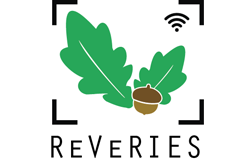
ReVeRIES
Project: Interactive, Fun and Educational Plant Recognition on Smartphones
Date: 01/2016 - 09/2021
Funding: ANR
Call: Generic
Partners: liris (France), EVS (France), LISTIC (France), IRHS (France)Author(s): Sébastien George, Pierre-Yves Gicquel, Ludovic Hamon, Pierre Laforcade, Iza Marfisi, Dominique Py
URL: https://reveries-lium.univ-lemans.fr/
The urbanization of society has gradually separated men from the plant world. Indeed, most people no longer live in a natural environment and have forgotten the names of plants and trees and the potential uses that can be made of them. Still, generations of botanists have accumulated knowledge about plants and many people are interested in nature and aware that natural resources are a treasure we must preserve. However, it is undeniable that, for a majority of people, botany remains difficult to understand. ► Read more
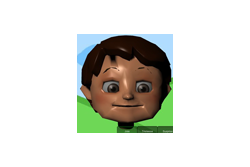
EmoTED
Project: Designing a VR environment supporting the learning of emotions mimicry for children with ASD
Date: 09/2015 - 09/2016
Funding: Collectivités Lavaloises
Call:
Author(s): Pierre Laforcade
URL: https://lium.univ-lemans.fr/en/emoted/
The EmoTED project aims to explore Virtual Reality technological solutions and techniques in order to help the mimicry of emotions for children with ASD. It involved two academic partners, ENSAM and LIUM, and one association about ASD, Cocci’Bleue. The project was supported by a programme funding organisation from local authorities for a period of 18 months. The project followed a global action-research methodology towards a main objective: to design and develop a facial-recognition prototype for helping children with ASD to learn about the mimicry of emotions. ► Read more
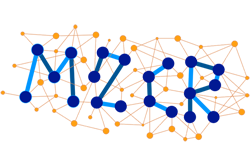
M2CR
Project: Multilingual Multimodal Continuous Representation for Human Language Understanding
Date: 06/2015 - 06/2019
Funding: Autres
Call: Chistera
Partners: MILA (Canada), CVC (Espagne)Author(s): Loïc Barrault, Fethi Bougares, Nathalie Camelin, Yannick Estève, Mercedes García Martínez, Sahar Ghannay, Adrien Bardet, Ozan Caglayan
URL: http://m2cr.univ-lemans.fr/
Communication is one of the necessary condition to develop intelligence in living beings. Humans use several modalities to exchange information: speech, written text, both in many languages, gestures, images, and many more. There is evidence that human learning is more effective when several modalities are used. There is a large body of research to make computers process these modalities, and ultimately, understand human language. These modalities have been, however, generally addressed independently or at most in pairs. However, merging information from multiple modalities is best done at the highest levels of abstraction, which deep learning models are trained to capture. ► Read more

JOKER
Project: JOKe and Empathy of a Robot/ECA: Towards social and affective relations with a robot
Date: 01/2014 - 07/2017
Funding: EU H2020
Call: CHIST-ERA 2012
Partners: LIMSI (coordinateur) (France), UCD (Irlande), UMONS (Belgique), KOC University (Turquie)Author(s): Yannick Estève, Nathalie Camelin, Simon Petitrenaud, Sylvain Meignier, Daniel Luzzati
URL: https://lium.univ-lemans.fr/en/joker/
This project will build and develop JOKER, a generic intelligent user interface providing a multimodal dialogue system with social communication skills including humor, empathy, compassion, charm, and other informal socially-oriented behavior. ► Read more

HUBBLE
Project: Human obervatory based-on e-learning traces
Date: 01/2015 - 12/2018
Funding: ANR
Call: Generic
Partners: LIG (France), LIP6 (France), Lina (France), Liris (France), OpenClassRooms (France), ifé (France), STEF (France), Lab-STICC (France)Author(s): Inès Dabbebi, Sébastien George, Sébastien Iksal, Madeth May
URL: http://hubblelearn.imag.fr
The objective of the Hubble project is to create a national observatory for the building and sharing of massive data analysis processes, from traces left in e-learning environments. Hubble will enable to analyze and explain phenomena of teaching and learning with these environments. ► Read more

JEN.lab
Project: Digital Epistemic Game Lab
Date: 01/2014 - 12/2018
Funding: ANR
Call: Generic
Partners: ifé (France), icar (France), Liris (France), Symetrix (France)Author(s): Sébastien George, Sébastien Iksal, Guillaume Loup, Iza Marfisi, Lahcen Oubahssi, Claudine Piau-Toffolon
URL: http://jenlab.fr
In a context marked by the necessity of developing the attractiveness of training courses, receiving new types of learners and designing learning systems that help to develop skills rather than strictly disciplinary knowledge, digital epistemic games come up as an alternative pedagogy to traditional approaches. Epistemic games are playful and authentic learning situations that lead the learner to solve complex and non-determinist issues. These games are based on simulation, augmented reality and tangible interfaces in order to design authentic learning situations in terms of interactions enabled. They aim at developing the learner’s capacity to mobilize a number of various resources (knowledge and skill sets) in a given context and his/her ability to reflect on this approach as well as on the learner’s capacity to reorganize of these resources. Thus, from a pedagogical point of view, epistemic games rely on a skills-based approach. ► Read more
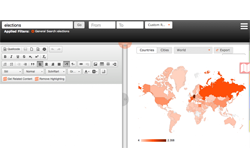
EUMSSI
Project: Event Understanding through Multimodal Social
Date: 11/2013 - 10/2016
Funding: EU FP7
Call: ICT-2013.4.1 Content analytics and language technologies
Partners: UPF (Spain), L3S (Germany), VSN (Spain), GFaI (Germany), IDIAP (Switzerland)Author(s): Yannick Estève, Vincent Jousse, Sylvain Meignier, Paul Deléglise, Nathalie Camelin
URL: https://www.eumssi.eu/
L’objectif principal de EUMSSI est de développer des technologies d’identification et d’agrégation d’informations non structurées provenant de sources de nature très différente (vidéo, image, audio, texte) et de différentes langues (anglais, allemand, espagnol et français). Je suis responsable de l’analyse en locuteur et nous développons conjointement avec l’IDAP un système d’identification multimodale des personnes. ► Read more

VERA
Project: AdVanced ERror Analysis for speech recognition
Date: 01/2013 - 01/2016
Funding: ANR
Call: Blanc
Partners: LNE (France), LPP (France), LIMSI (France)Author(s): Nathalie Camelin, Daniel Luzzati, Paul Deléglise, Sylvain Meignier, Yannick Estève
URL: https://lium.univ-lemans.fr/en/vera/
The VERA project aims at developing tools for diagnostic, localization, and measurements of automatic transcription errors. This project is based on a consortium of first-rate academic actors in this field. The objective is to study the errors in detail (at the perceptive, acoustico-phonetics, lexical, and syntactic levels) in order to yield a precise diagnosis of possible lacks of the current classical models on certain classes of linguistic phenomena.
► Read more
ARVAD
Project: ARVAD
Date: 01/2013 - 01/2016
Funding: Région Pays de la Loire
Call: appel à projet "REALITE VIRTUELLE ET SITUATION DE HANDICAP"
Author(s): Sébastien Iksal, Lahcen Oubahssi, Claudine Piau-Toffolon
URL: http://perso.univ-lemans.fr/~loubah/ARVAD/
Les ULIS (unités localisées pour l’inclusion scolaire) accueillent des élèves présentant des troubles cognitifs ou mentaux. L’objectif principal de la scolarisation dans la classe ULIS est le développement d’une autonomie adulte et d’une insertion socioprofessionnelle durable dans la société. ► Read more

GraphiT
Project: Specification of GRAPHIcal Visual Instructional Design Languages centered on LMS languages and directed towards Teachers-designers needs and practices
Date: 02/2012 - 09/2015
Funding: ANR
Call: Young resercher
Author(s): Nour El Mawas, Sébastien Iksal, Pierre Laforcade, Lahcen Oubahssi, Claudine Piau-Toffolon
URL: http://graphit.univ-lemans.fr/
Nowadays, LMSs are widely spread in academic institutions and not restricted to distant courses but are also useful during or in complement to face-to-face learning sessions. Design skills can be acquired through specific teacher education programs, often focusing on the features and technical aspects of the platform. Few courses deal with how to design pedagogically sound learning situations. Teachers develop ad hoc and individual learning design techniques by diverting and experiencing combination of LMSs’ features and functionalities. In such context, it is relevant to help teachers in focusing on pedagogical aspects and their instructional design setting-up for the specific LMS they have at their disposal. ► Read more

 Français
Français
